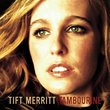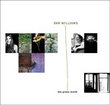| All Artists: Freedy Johnston Title: Right Between the Promises Members Wishing: 1 Total Copies: 0 Label: Elektra / Wea Original Release Date: 1/1/2001 Re-Release Date: 8/7/2001 Genres: Country, Alternative Rock, Folk, Pop, Rock Styles: Americana, Singer-Songwriters, Contemporary Folk, Adult Contemporary, Singer-Songwriters, Adult Alternative, Folk Rock Number of Discs: 1 SwapaCD Credits: 1 UPCs: 075596265225, 755962652254 |
Search - Freedy Johnston :: Right Between the Promises
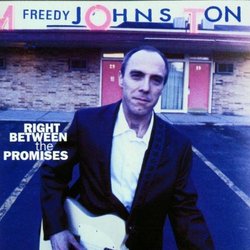 | Freedy Johnston Right Between the Promises Genres: Country, Alternative Rock, Folk, Pop, Rock
Freedy Johnston's best songs can convey more in a single detail--"And these pills won't even let me cry," mourns the haunted narrator of "This Perfect World"--than most artists can express in an entire album. There's nothi... more » |
Larger Image |
CD DetailsSynopsis
Amazon.com Freedy Johnston's best songs can convey more in a single detail--"And these pills won't even let me cry," mourns the haunted narrator of "This Perfect World"--than most artists can express in an entire album. There's nothing quite so poignant on Right Between the Promises, Johnson's fourth album for Elektra and sixth overall. In fact, the album's most aching sentiments are reserved for something not at all human, as the riffy verses of "Back to My Machine" melt into a chamber-pop chorus with Johnston crooning "Oh how I wish you were real." Tasteful string arrangements also complement Johnston's melancholy vocals on "That's Alright with Me," "In My Dream," and the gorgeous "Arriving on a Train," while "Radio for Heartache" strips the formula down to its essence, just Johnston and his ukulele. There's also a pleasant, if not particularly revelatory, cover of the 1970 Edison Lighthouse hit, "Love Grows (Where My Rosemary Goes)," but with the entire album clocking in at just 38 minutes, more of Johnston's original hook-filled heartbreak would have been welcome. All in all, a must for Johnston followers, but newcomers may want to start out with This Perfect World and work their way forward. --Bill Forman Similarly Requested CDs
|
CD ReviewsSomething lacking... 06/26/2002 (2 out of 5 stars) "Freedy Johnston earned the right to be called "an American original" by Rolling Stone when he released "This Perfect World". It followed on the heels of "Can You Fly", and in tandem, these are two of the best singer-songwriter records you'd ever want to buy. The imagery inherent in the lyrics, the power of the story telling and the melody that tied it all together left you wanting more.Unfortunately, this album doesn't hold up to the standards Freedy set for himself. He almost sounds like he's gotten lazy, ripping off his own, now tired chord changes. The stories sound as though he rushed his way through the lyrics and the New York edge that spun through "Perfect..." and "...Fly" is gone.I love Freedy and wish he'd awaken to his former self." Incredible John Malloy | South Berwick, ME USA | 08/08/2001 (5 out of 5 stars) "Having been a fan of Freedy's after purchasing Blue Days, Black Nights and then his back catalogue, this record is another beautiful addition. More of a pop slant to this one and it challenges the best of Big Star. All the songs are well-written, there's not a clunker on here and the cover of "Love Grows" fits really well with the feel of the record. It's a sunny day record with the occasional song for a passing cloud." A Good Listen John Malloy | 12/01/2001 (3 out of 5 stars) "I'm a long time fan of Freedy, and I'm enjoying this mellow CD. I find myself humming songs from it frequently. I'm having difficulty rating Right Between the Promises without comparing it to Freedy's past recordings. My response has been a sigh of relief that the CD is comfortable and good, rather than a WOW! what a brilliant project."
|

 Track Listings (10) - Disc #1
Track Listings (10) - Disc #1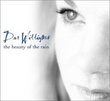

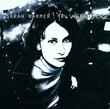

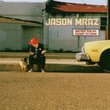

![Sly & the Family Stone - Greatest Hits [Epic]](https://nationalbookswap.com/cd//m/63/8263/18263.jpg)
